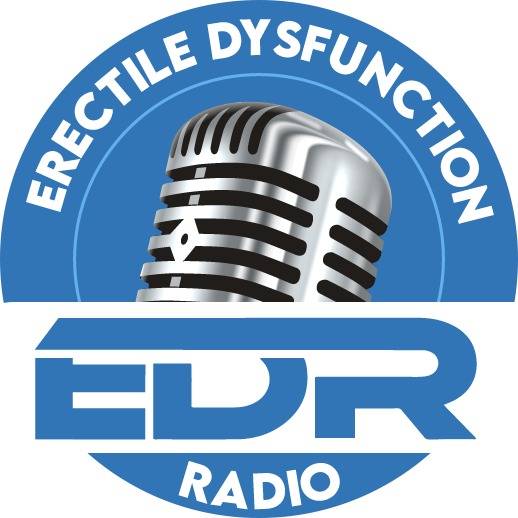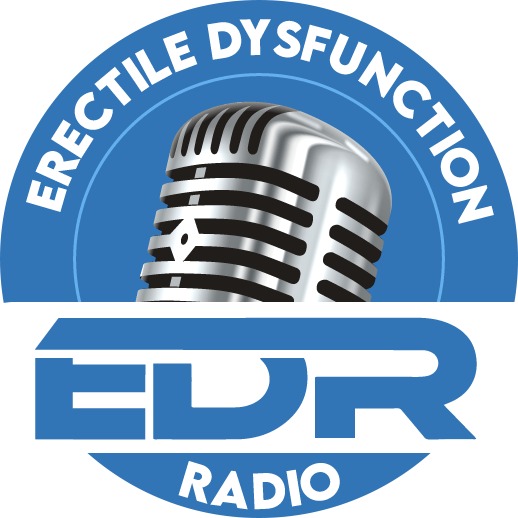
Listen to Vasectomy and Erectile Dysfunction with Dr. David Sigman through the podcast player above.
Erectile Dysfunction Radio Podcast
Dr. David Sigman joins us to discuss vasectomy and how it can impact erectile dysfunction. Dr. Sigman is a urologist and a partner with Chesapeake Urology. He is also a Clinical Instructor at the University of Maryland School of Medicine in Baltimore.
The Erectile Dysfunction Radio Podcast empowers men to address erectile dysfunction, improve confidence, and enhance the satisfaction in their relationships. This podcast is hosted by certified sex therapist, Mark Goldberg, LCMFT, CST.
Transcript of Episode 19 – Vasectomy and Erectile Dysfunction with Dr. David Sigman

Mark Goldberg: Today, we are joined by Dr. David Sigman. Dr.Sigman is a board-certified urologist, a partner at Chesapeake Urology, and a clinical instructor at the University of Maryland School of Medicine.
He also serves as the Chief of Urology at Sinai Northwest Hospitals in Baltimore, Maryland. His clinical interests include erectile dysfunction and prosthetic surgery, kidney stone disease, prostate disease management and vasectomy.
So Dr. Sigman, we try to cover as many topics relating to erectile dysfunction as we can, and we know there are a lot of them out there. One of the issues that I’ve seen in my clinical practice relates to the onset of erectile dysfunction around the time of having a vasectomy, I think our listeners could benefit from learning about vasectomy and the relationship, if there is any, to erectile dysfunction.
So can we start by trying to understand a little bit about what a vasectomy is?
Dr. Sigman: Absolutely, so vasectomy is a permanent form of sterilization, and when we say permanent, we mean, people need to consider if they want to have any further children or not.
Certainly, a vasectomy can be reversed, but there is a lot that goes into reversing a vasectomy, it tends not to be covered by insurance. It’s a much longer, more difficult procedure, so when it’s time to have a vasectomy, we really have people consider the fact that we do consider this to be a permanent form of sterilization.
What we do within a vasectomy is we remove a little section of the vas deferens, the tubes that allow the transport of sperm that allow for fertility, and we remove the tube, and we seal those tubes so they can’t reconnect themselves.
Really, that’s the procedure, it doesn’t have any impact on the rest of the plumbing or sexual functioning aspects of an individual, but it does remove the ability of sperm to be ejaculated that could allow for future fertility.
Mark Goldberg: Okay, so just to clarify, this should not interfere with the physical components relating to an erection, is that correct?
Dr. Sigman: Yeah, so it should not. In order for a man to have an erection, there has to be the desire to be in a sexual situation which allows for erection, so the brain must be intact, there’s a hormonal aspect of erections related to testosterone, this has no impact on testosterone, it has no impact on sensation of the penis or the genitalia, so this really has no side effects with regards to the physiologic aspects of erections.
Mark Goldberg: Okay, it’s really, really important for our listeners to know about that. Now, you mentioned that the idea here is to sever a section of the vas deferens, is that correct?
Dr. Sigman: That’s correct.

Mark Goldberg: Now, does that have any impact on ejaculation?
Dr. Sigman: So that’s a very good question, and that’s something I think your listeners really need to understand and something that I talk to all my patients about. When a man ejaculates, the volume of the ejaculate that’s produced is anywhere between two and a half to 5 milliliters of fluid, the amount that comes from the testicle is only about 0.5 milliliters.
After a vasectomy, a man is still going to ejaculate, and that fluid is going to come from the prostate gland and the seminal vesicles, there’s just going to be no sperm in the ejaculate, so men really can’t tell what the volume of ejaculate is, it’s really imperceptibly different. They would not recognize that there’s any change in the volume of ejaculate.
Mark Goldberg: So the ejaculation should be largely the same, at least experientially, is that correct?
Dr. Sigman: That’s true. It really should. The sensation of ejaculation and orgasm is no different after a vasectomy, and the volume of fluid is really minimally less, the only thing that’s not in the fluid are sperm.
I usually kind of joke with my patients and say, actually, the whole process of sexual activity after a vasectomy should be more rewarding because there’s no worry about fertility if you’re trying to consider yourself infertile and not have any more children.
Mark Goldberg: And we’re going to circle back around to some of those components, the pleasure aspect of sex post-vasectomy, as well as the fertility or fear of an unwanted pregnancy.
Dr. Sigman: Sure.
Mark Goldberg: But in the interim, Dr. Sigman, can you share any common fears that men have expressed to you over the years about going through this procedure?
Dr. Sigman: The number one fear is pain, and most people are a little bit anxious when they come to the office. I tell them if they’re not anxious, I’ll worry a little bit more about them because from a young age, men are taught to protect their genitals from injury, and when I’m coming at a man’s genitals with a sharp instrument, it’s a little bit disconcerting, and I reassure men that we use a lot of local anesthetic to keep them comfortable during the procedure.
The discomfort from the procedure really is limited to about 5-10 seconds on each side as we numb up that area, so that’s really men’s first source of fear or anxiety. And again, some of their fear is about  what is sexual activity going to be like after a vasectomy?
what is sexual activity going to be like after a vasectomy?
Some men feel that the fact that they’re no longer able to obtain a pregnancy afterward, and the fact that they’re infertile makes them less, I would say “manly,” and that’s something that we have a discussion about as well.
We let them know that it doesn’t change testosterone, it doesn’t change what they view about being a man, and it doesn’t change their virility or ability to be a sexual being, it just changes the fact that they no longer are going to be able to have children.
Mark Goldberg: Yeah, and we can appreciate, certainly on this podcast, the importance that a man may place on the ability to have children in terms of their own sense of his manhood, and how that can impact sexual function, certainly something that I have worked with a number of men on post-vasectomy and going through that transition period.
Dr. Sigman: Right.
Mark Goldberg: What is the recovery period after a vasectomy?
Dr. Sigman: So the overall recovery period is really about five days, what I tell men the first day is they’ll go home after the procedure, with a bag of ice, frozen peas, whatever it is that’s cold on their lap and they’ll ice on and off for the first 24 hours.
They’ll lay on the couch the first day, not too much activity, I tell them that their partner, children, everybody around them needs to be nice to them that day, then for the next four days after that, I ask them not to do a lot of heavy lifting, strenuous activity, no sexual activity for the first five days, and then they can resume sexual activity thereafter.
Mark Goldberg: Okay, and you kind of led right into my next question, Dr. Sigman, I was wondering about the instruction to not ejaculate after a vasectomy, and you said that that should last for about five days, correct?
Dr. Sigman: That’s correct. And after five days, there’s still sperm that can be adjacent to the tubes and the whole genital-urinary plumbing system, so it really takes about 15 to 20 ejaculations or about two months to clear the sperm from the track.
What we tell men is, once they’ve achieved either 15 to 20 ejaculation or if two months has gone by, we ask them to do a semen analysis at the lab where they would ejaculate into a cup at home, take it to the lab, not more than two hours old, and at that point in time, we’d get a semen test, and as long as there’s no sperm within the ejaculate, we tell the men that they’re clear for unprotected sex, but until that time, it’s imperative that they continue to use contraception.
Mark Goldberg: Dr. Sigman, you mentioned earlier about a reversal of vasectomy, can you describe to our listeners a little bit more about what that procedure is like?
Dr. Sigman: So it’s about a two to three hour procedure typically done with anesthesia because it’s very sensitive to do that. The tubes that transports sperm, the vas deferens tubes are quite small, and it’s easy to remove the tubes, but if you have to saw them back together to maintain the patency or openness of the tube, it requires sutures that are about the size of one’s hair, so it’s very delicate surgery, it takes time.
 It’s also done under an operating microscope because we need a lot of magnification to make sure the procedure is done properly, and we’ll place somewhere between four and six sutures in each vas tube in order to re-attach them, and that can take up to two to three hours to do for people who are very well trained to do that, not all urologists are able to do that, and most who do that have advanced training in a fellowship as far as male and fertility goes.
It’s also done under an operating microscope because we need a lot of magnification to make sure the procedure is done properly, and we’ll place somewhere between four and six sutures in each vas tube in order to re-attach them, and that can take up to two to three hours to do for people who are very well trained to do that, not all urologists are able to do that, and most who do that have advanced training in a fellowship as far as male and fertility goes.
Mark Goldberg: So it sounds like a very, very delicate process to reverse a vasectomy, what would you say is the success rate on that procedure?
Dr. Sigman: So in a well-trained surgeon, within the first five years, the success rates are about 90%, after five years, they wane a little bit, but those would really… those people who consider it a little bit earlier on, following a vasectomy have a better success.
Mark Goldberg: Is a risk that once a man goes through a vasectomy, it may not be reversible in all cases, is that correct?
Dr. Sigman: That’s correct.
Mark Goldberg: Okay, now, does the reverse vasectomy impact erectile function at all?
Dr. Sigman: It does not, it’s the same concept and process where all we’re doing is re-attaching the tubes, so the process of erection, ejaculation is all the same. All we’re doing is allowing sperm to get back into the ejaculate in order to achieve a pregnancy.
Mark Goldberg: Okay, good. I’m sure our listeners will be glad to hear that. Now Dr. Sigman, what are some of the things that you have heard over the years from patients about sexual performance challenges before or after a vasectomy?
Dr. Sigman: So I haven’t heard a whole lot before, although in the days leading up to a vasectomy, there certainly can be a little bit of anxiety about the procedure, and that may certainly have an impact on sexual functioning, certainly erectile dysfunction after a vasectomy is something that’s very well-noted and tends to be more from a, what we call psychogenic aspect.
I think there can be some deep, deep-seated thoughts in men about the inability to father children in the future after a vasectomy, if there’s any residual discomfort after the procedure, that certainly can have an impact on sexual functioning, and I think men worry the first time they ejaculate after a vasectomy, what that might be like? Is it going to be painful?
And so that aspect of their sexual functioning certainly could impact erections immediately after the procedure.
Mark Goldberg: And how common would you say it is that a man will experience some type of challenge with sexual functioning post-vasectomy?
Dr. Sigman: I would say in my experience, maybe 10% – 20%, and I usually counsel my patients and try to talk them through things to let them know that nothing from a physical aspect has changed other than the inability to have children, to let them know that if they’re having some residual pain that it may take a little bit of time to go away, help them with anti-inflammatory medication, but just to let them know that everything should be as it was prior to the vasectomy over time.
 Mark Goldberg: And in your experience, do you find that with your proper counseling guidance, proper information, men are generally able to resolve that dysfunction, it remains temporary and doesn’t require further medical treatment?
Mark Goldberg: And in your experience, do you find that with your proper counseling guidance, proper information, men are generally able to resolve that dysfunction, it remains temporary and doesn’t require further medical treatment?
Dr. Sigman: For the most part, yes. But there are a section, sub-section of patients who still have some issues, and I find that those patients really benefit from sexual counseling with somebody well-versed in sexual counseling, and I’ve certainly used that for some of my patients who still struggled with some erection issues following vasectomy.
Mark Goldberg: Well, that’s been very informative. Thank you very much, Dr. Sigman, so as a wrap up, just to make sure that our listeners have gotten the main points, vasectomy should not be having any physical impact on the erection process?
Dr. Sigman: That’s absolutely correct.
Mark Goldberg: Alright. There are some men who will harbor fears leading up to the procedure and may have some concerns post-procedure, man who receive good information generally can resolve that on their own.
There is a subset of people that may need a little bit more intense counseling to help overcome some of the psychogenic or some of the brain components, or the anxieties that might be negatively interfering with their sexual performance, but this should be a resolvable issue for the vast majority of men. Is that correct?
Dr. Sigman: Absolutely, I think that’s spot on. And I think just like anything else in medicine, I think giving people realistic expectations prior to any procedure is very important, and that’s why I really take time to sit down with people, let them know what to expect from a discomfort standpoint and explain how the procedure is done and what they can expect before and afterward.
We always discuss the various aspects of sexual functioning, just to let them know what the possibilities are and what they can expect.
Mark Goldberg: Thank you for coming on to the podcast today and helping to get some of this information out there, I know that it’s not specific to any one patient, but even this general information really goes a long way to help empower our listeners to be able to overcome any challenges they have with sexual function through this just excellent expertise and excellent information that you provide.
Learn more about Dr. Sigman’s practice with Chesapeake Urology.
Subscribe to our Podcast
All ED Radio Podcast episodes are available on this website, ErectionIQ.com. You can also find and subscribe to it for free on Apple Podcast/iTunes, Spotify and YouTube.
Ready to Learn More?
To start your in-depth approach to resolving ED, try our online learning course called BEYOND THE LITTLE BLUE PILL, The Thinking Man’s Guide to Understanding and Addressing ED.

Ready to talk to an ED expert? Erection IQ founder Mark Goldberg helps men resolve erectile dysfunction. He offers individual, one-on-one services to men throughout the world through a secure, telehealth platform. It’s 100% confidential. You can visit the Center for Intimacy, Connection and Change website to
Schedule A Consultationwith Mark.




